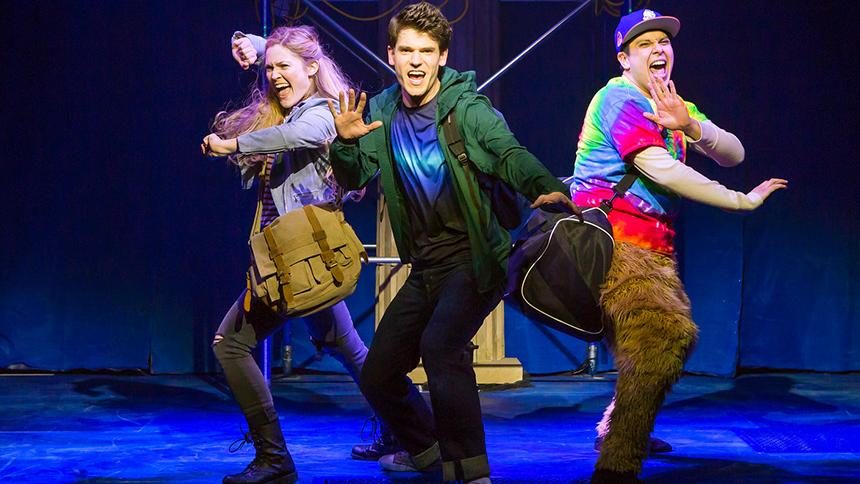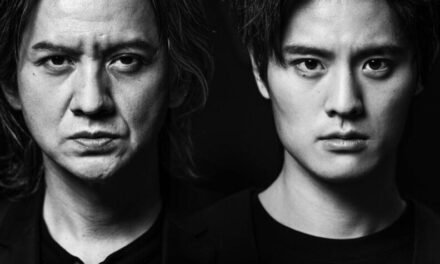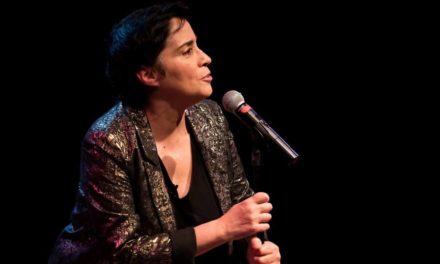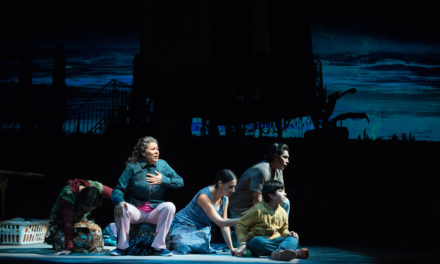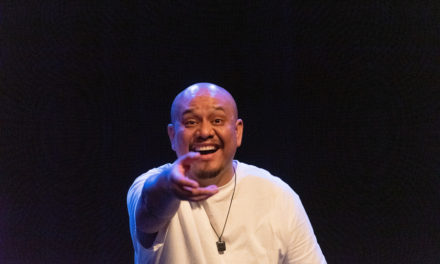Rob Rokicki is a Drama Desk, Lortel, and Off-Broadway alliance-nominated composer/lyricist. His musicals include Love, NY, Relativity, Strange Tails, Martha & Me, Monstersongs, and The Lightning Thief, and have been performed at New World Stages, Theatre Row, Lucille Lortel Theatre, and NY Fringe. Rob is a member of the Dramatists Guild, Actor’s Equity, and is an alum of the BMI Lehman Engel Musical Theatre Writing workshop. He is currently on the musical theatre faculty for CAP21 Conservatory and Pace University.
Rob began working on The Lightning Thief in 2013, originally as an hour-long adaption that was nominated for a Lortel Award for Outstanding Musical before touring the country. I called Rob on a breezy fall day as he navigated the New York City urban jungle to discuss his most recent two-act adaptation of the show that had a Drama Desk-nominated sold-out run at the Lucille Lortel Theatre, and is embarking on a national tour in summer 2018.
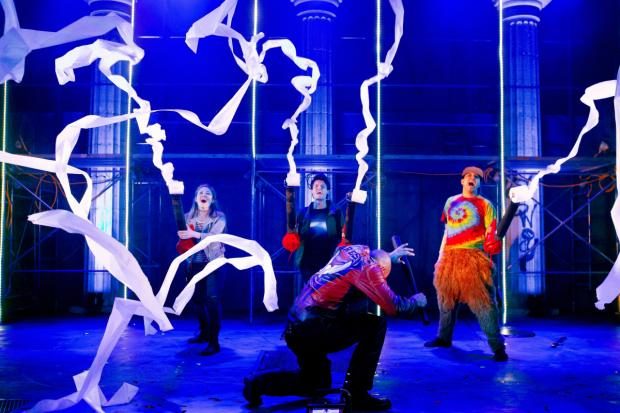
Photo courtesy of Jeremy Daniel
Mark: Hey Rob, thanks so much for taking some time today to speak with me about The Lightning Thief.
Rob: My pleasure!
Mark: The Lightning Thief was originally a best-selling novel published by Rick Riordan through Disney-Hyperion in 2005, the first in a series called Percy Jackson & The Olympians. It sold over 1.2 million copies in the subsequent four years and has been translated into 18 languages. What did you know about the novel before you started working on it?
Rob: Literally nothing. I had heard the name…but I did not know the book at all.
Mark: What was the first thing you did when you were asked to work on it?
Rob: Well I immediately read the book and loved it. It was pretty dense but luckily Joe Tracz had already written a treatment for a play. I read the play and I thought, well this is easier. I can actually see where things need to go, things were a bit more narrowed down than in the book. The relationships were clearer…the relationships between the characters.
Mark: So there was a movie released in 2010 directed by Chris Columbus. Did the movie play at all into this adaptation or did you guys kind of avoid it?
Rob: I watched the movie once, and then I kind of forgot about it. It was so not the vibe I had gotten from the book or the play. Joe and I wanted to capture the feel of everyone sitting around a campfire, of young unlikely heroes on an adventure. Theatreworks actually reached out to Joe Iconis to work on it, and he said, well this is really a project for Rob, you guys should talk to Rob. And then, they called me in and I still had to write three songs for them as a test, and these three songs have actually changed the least out of all of them through the reading, the one-hour versions, and the two-hour version. I thought about the relationships and decided the most important relationship was between Percy and his mother Sally. And that’s how Sally’s song Strong was born.
Mark: Did you write both the music and the lyrics?
Rob: Yes all the music and lyrics.
Mark: And did you get any direction from Rick Riordan or his estate about their wishes for the show?
Rob: We did a reading for Rick’s agents, Marietta Zacker and Nancy Gallt. They were really lovely…the agency was basically like “You can do that” and “You can’t do that” and “You can try to do it this way.” For example, initially we were gonna combine Clarisse and Annabeth into one character, make her into some kind of big antagonist, and they told us we weren’t allowed to do that. Especially with the bad guys, like for example combining Ares and Hades–they told us we couldn’t that, so we had 10 characters we needed to work with but we wanted to focus on the main 3–Percy, Grover, and Annabeth. It was really important to us to get the tone of the piece right.
Mark: In the one-hour version, most of the actors had to cover several characters at once. What was reason to originally combine Clarisse, a bully at Camp Half-Blood, and Sally, Percy’s mom, into one actor track?
Rob: So we only had a limited amount of actors and we were thinking about how Clarisse is scary, she’s a bit intimidating, and Sally is also very confident. So both of them are powerful forces in Percy’s life. We wanted to think about the best way to cover all these characters like Ares, Hades, Poseidon, and the best actors for each track. We really wanted to keep Annabeth, Percy, and Grover each as one actor because their journey is so central and focused. Although in our recent off-Broadway version, George actually played both camp director Mr. D and Grover, which worked because they were complete opposites as characters and George Salazar is an actor that can really handle that kind of challenge.
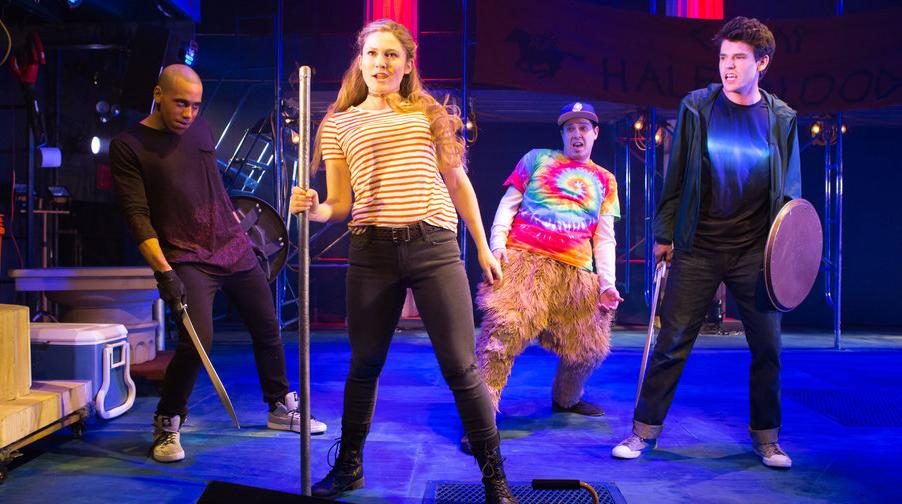
Photo courtesy of Jeremy Daniel
Mark: Some fans were surprised that all of the actors were adults. Why not go with kids to play kids?
Rob: Well, first of all, working with children is very difficult with a TYA or Theatreworks contract. There are a number of considerations with work hours, school, etc. Secondly, the style of the show…well, some kids can sing rock, but this show is too demanding to depend on a kid vocalist. We didn’t want to be restricted by the limitations of a young vocal range. The other reason and this is a biggie, is that we needed actors to play both kids and adults in the show. We originally had one actor playing Clarisse, a camper, and Sally, a grown-up mother. We needed actors to be able to switch from camper to adult and back throughout the show. And also, these characters really grow up and change as the play goes on. If someone were doing a stage adaptation of Harry Potter, would they want nine-year-olds to play the characters because that’s how old they were in the first book? No, they’d probably want 16 or 17-year-olds that could really do justice to the hero’s journey. The stakes are much higher when the actors/characters are a bit older.
Mark: That’s definitely a good point. What were some other considerations in casting?
Rob: Well, in terms of Percys, we’ve had a lot of different actors play Percy throughout the years and the whole casting team thought Chris McCarell had exactly the quality we look for in the role. He did a fantastic job in our recent off-Broadway run. And you know we wanted to make the show as ethnically diverse as possible. In our last run, Sally was played by Carrie Compere, and Luke was played by James Hayden Rodriguez, both actors of color…and the fans were totally into it. I’ve never wanted to limit any casting based on gender, age, or race. And we haven’t in the tours of the show. The only thing I can think of that was a casting consideration was that Annabeth is described in the novel as having striking blonde hair. This was to challenge the stereotype that the “pretty blonde girl” couldn’t also be smart and a warrior. Kristin Stokes who played Annabeth in our last run actually volunteered to dye her hair blonde for the show and from the response from fans, I think they really appreciated that.
Mark: So what would you call the genre of the music you composed?
Rob: I would definitely say its pop/rock. You know, there are more cinematic moments, like for the epic battles with the Minotaur, I was originally inspired by Gustav Holst’s The Planets. This piece is based on Greek myth, so I really wanted to convey that there are huge battles between the gods. There are even some heavy metal moments; inspired by bands like Metallica with dueling counterpoint on electric guitar lines, they really create that epic sound. For the scarier parts, I went into melodic minor, things like that–for example in a song like The Oracle. We also created individual sounds, and instrumentation ideas for all the characters–you know the electric guitar for Ares, the Rhodes for Annabeth to illustrate the “ticking” computer in her brain. We wanted Charon to have a more R&B sound to introduce the underworld, which is set as a record company.
Mark: What would be your “dream” orchestra for Lightning Thief?
Rob: Oh man, if we were to have a brass section–that would be incredible. That would add so much, especially to the battles. You know, each character has their own instruments that are kind of like their themes–Grover has the guitar for the campfire, Annabeth has the rhodes, Sally is a really warm character, you know acoustic piano and guitar for her. One of the amazing parts of the recent off-Broadway production was that we really wanted it to be like DIY, things that kids could really find in summer camp. The arrangement of drums, guitar, bass, and Mainstage piano, which we could fabricate many different special sounds with, was great and anything else would really be “extra.” I would say the show isn’t really a string or violin show.
Mark: And is the tour going to have a live band?
Rob: Yes, I fought hard to ensure a live band for the tour.
Mark: That’s awesome. I think the live band is an essential driving force for the show. How was working in the Lucille Lortel a plus or a minus for the show?
Rob: I love the Lortel Theatre. It has very unique acoustics. The sound gets very wide, loud, volatile, and dangerous. Our set was really cool and we had amazing sound designers who could get that rock show feeling that we were looking for.
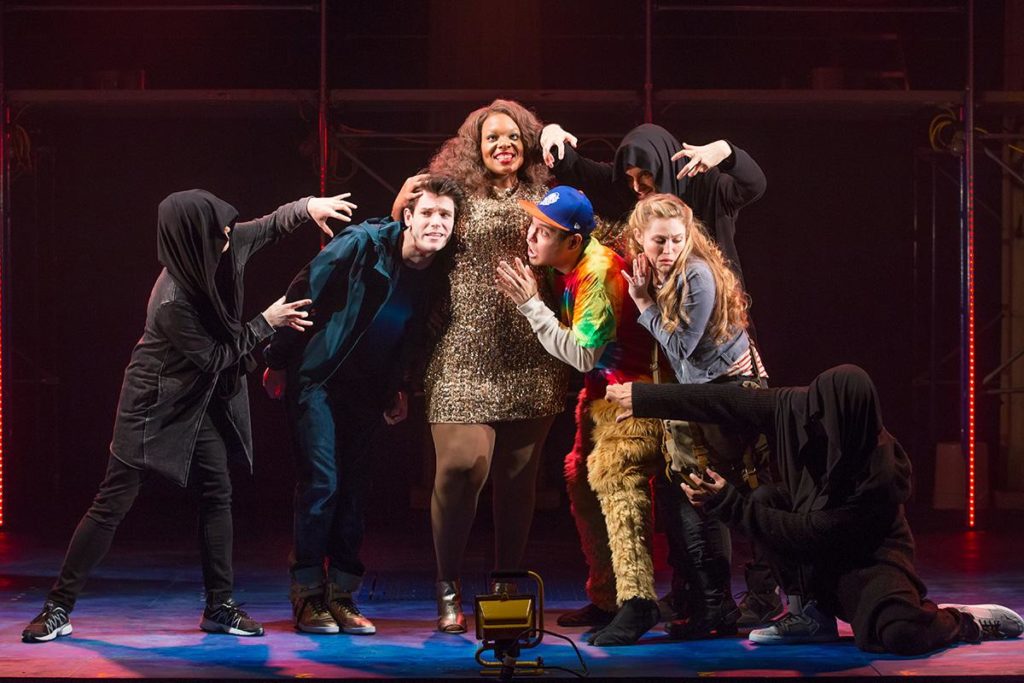
Photo courtesy of Jeremy Daniel
Mark: There were so much international contact and demand for the cast album. Do you see yourself taking the show globally?
Rob: Absolutely. I mean the novel has been translated into so many different languages. My nieces in Germany love the book and you know, they read it in German. That goes for people in Sweden, people in Australia, people in Greece. I really wanna bring the show to anyone who wants to see it. And I want to know how different directors would do it. You know, how would it work and look for different theatres and venues and different designers. What would happen with the lights and sound? That being said, Stephen Brackett did an absolutely incredible job directing this past production.
Mark: Is Stephen Brackett directing the tour?
Rob: I hope so! I really love all the creative team from the last run, I’d love to keep them all.
Mark: And what are the plans for the show after the tour?
Rob: Well if the tour goes well, I’d love to bring the show back to New York, whether off-Broadway or Broadway…but even if the tour happens and that’s the end, then that’s great and I’m very grateful we got to do it…but I would love to bring it back to New York. You know the book is set in New York and Long Island so a lot of those kids really identify with it and it would be great for it to have a home here.
Mark: What’s something that really surprised you while working on Lightning Thief?
Rob: I think that it was amazing to see people fall in love with the show the same way that I fell in love with the book. I would read notes from 14-year olds and 30-year olds saying “this show helped me get through a really tough time” or “this song is exactly how I feel” and that’s an incredible feeling. The fans have shown such incredible support–you know there are even these animated videos fans have put up on YouTube and Facebook with their own versions of songs and scenes from the show.
Mark: Well this show has definitely gotten me through some tough times. I never get sick of listening to it!
Rob: Thanks so much. I think the important takeaway from this show is that we have to face our “monsters.” You have to actively seek out the things that scare you, the things that intimidate you and try to take them on, erase them, and challenge them, or you’ll never ever find any kind of peace. And in the end, that’s actually a hopeful thing. It’s something we grapple with living in New York–I love living here but I have a somewhat fatalist point of view–that things are bad and it’s only going to get worse–and yet I get up every morning and fight to try to make the world a better place in some way. So if the show inspires someone to take on a challenge, then I’ve succeeded.
Mark: Well thank you so much for taking the time to chat. I’m excited to see what happens next with the show!
Rob: Me too! I’m thankful I’ve had the opportunity to keep crafting and perfecting it, and watching it grow into something beyond my wildest dreams.
Mark Galinovsky is a current MFA Candidate in Music Direction at Penn State University. His recent music directing and assisting credits include Priscilla, Queen Of The Desert (Piper Theatre), The Lightning Thief (Theatreworks), Seussical! (Little Radicals Theatrics), and The Little Shop Of Horrors (Westcoast Black Theatre Troupe). His musical The Extraordinary Fall Of The Four-Legged Woman was selected for the 2016 NY Fringe Festival and was invited to extend its run at Soho Playhouse as part of the Fringe Encores Series. Mark regularly works with organizations including NYMF, The Secret Theatre, Broadway Youth Ensemble, Davenport Theatrical, and Untitled Theatre #61. Mark holds a BM from NYU Steinhardt.
This post was written by the author in their personal capacity.The opinions expressed in this article are the author’s own and do not reflect the view of The Theatre Times, their staff or collaborators.
This post was written by Mark Galinovsky.
The views expressed here belong to the author and do not necessarily reflect our views and opinions.

